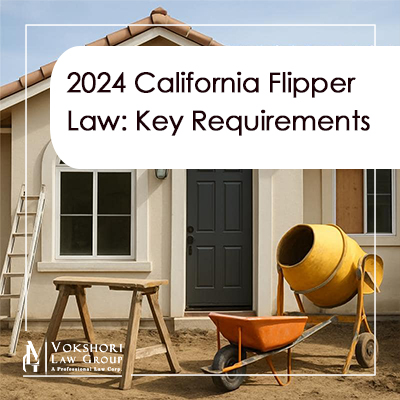
Home flipping has long been a popular real estate investment strategy in California, with average gross profits on flipped homes reaching $73,500 in 2024 (ATTOM Data Solutions). But as of July 1, 2024, a new California law—AB 968, codified as Civil Code § 1102.6h—significantly changes the disclosure obligations for certain sellers. Known as the California Flipper Law, it aims to increase transparency and protect homebuyers from hidden defects in recently renovated properties.
Here’s what real estate investors, sellers, and buyers need to know about this new law.
What Is the California Flipper Law?
Effective July 1, 2024, Civil Code § 1102.6h applies to sellers who:
- Sell a residential property with one to four units
- Accept an offer to purchase within 18 months of acquiring title
If these conditions are met, sellers must provide additional disclosures regarding recent renovations and repairs beyond the standard Transfer Disclosure Statement (TDS).
Mandatory Disclosures Under AB 968
If you’re selling a property within 18 months of purchase, you must disclose:
Description of Repairs or Improvements
Identify any room additions, structural modifications, or other alterations or repairs made since acquiring title that were performed by a contractor with whom you had a contract.
Contractor Information
Provide the name and contact information of each contractor who performed the work.
Permit Status
- Disclose whether the work was performed with permits.
- If permits were obtained, provide copies to the buyer.
- If permits were not obtained or if the contractor did not supply them, you must inform the buyer that the contractor may have copies and provide the contractor’s contact information.
Important: These requirements supplement existing TDS obligations and are governed by the same delivery deadlines and buyer cancellation rights.
Key Exemptions
The Flipper Law does not apply if the aggregate contract price for the labor, materials, and other items related to the work is less than $500. Small cosmetic repairs and maintenance below this threshold are not subject to the additional disclosures.
Liability for Non-Compliance
Failure to comply—whether willfully or negligently—can expose sellers to actual damages suffered by the buyer, along with possible legal fees and rescission claims. Given the potential for litigation, compliance is critical.
How This Impacts Real Estate Investors
The California Flipper Law adds new layers of responsibility and documentation requirements:
Record-Keeping
Maintain thorough records of all work performed, including contracts, invoices, permits, and contractor details.
Contractor Vetting
Always hire licensed contractors and verify their license status and insurance.
Permit Compliance
Ensure that all structural, mechanical, electrical, and plumbing work requiring permits is properly permitted and inspected.
Disclosure Preparation
Coordinate with your real estate attorney to ensure that all required disclosures are provided to the buyer before or at the time required by law.
How This Benefits Buyers
Buyers now have better visibility into the quality and legality of recent renovations. By reviewing the Flipper Law disclosures, buyers can:
- Verify that major repairs and renovations were properly permitted.
- Confirm that qualified professionals performed the work.
- Make informed decisions with fewer surprises after closing.
Market Impact
The Flipper Law is expected to:
- Reduce the number of poorly renovated flips on the market; (2) Encourage more professional, code-compliant renovations; and (3) Improve overall safety and quality of flipped homes.
Compliance Checklist for Sellers and Flippers
Document Everything: Keep a paper trail of all work performed, including contracts, invoices, and permits.
Use Licensed Contractors: Always verify licenses and maintain contact details.
Prepare Permit Documentation: Secure and provide copies of all permits, or document how the buyer can obtain them.
Work with Legal Counsel: Real estate attorneys can help prepare disclosures and reduce legal risk.
Let Vokshori Law Group Help You Navigate the 7/1/24 California Flipper Law
The 7/1/24 California Flipper Law makes flipping houses a little more complex, but it brings benefits for all. Sellers can avoid legal complications by disclosing all the work they have done on the property. Buyers avoid nasty surprises and make better purchasing decisions.
To successfully navigate the required disclosures, seek legal advice from the highest-rated real estate attorneys in California – Vokshori Law Group.
With offices throughout California, we truly understand Golden State property law. Our testimonials show we exceed our clients’ expectations, delivering great results and exceptional customer service. Contact us today for a free consultation with an experienced property attorney.
Call us at (855) 855-2608 or visit www.VokLaw.com to learn more.






